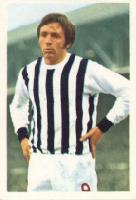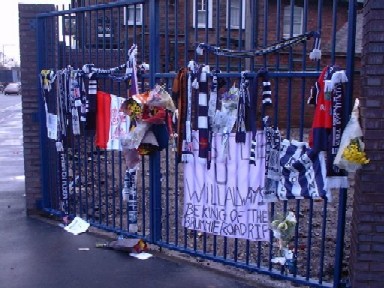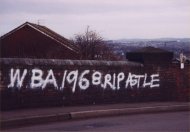 |
||||||||||||||||||||||||||
|
||||||||||||||||||||||||||
King of the Hawthorns
Bryn Jones pays tribute to Jeff Astle - an Albion legend in every respect
 |
| Jeff Astle Goalscorer and Showman Extraordinaire 1942 - 2002 |
In the post-war era Albion have had five outstanding strikers: Ronnie Allen, Derek Kevan, Cyrille Regis, Tony Brown and Jeff Astle. Ronnie Allen was the most technically gifted and Kevan the most powerful and prolific (173 goals in 291 games). Regis on the other hand was the most athletic and exciting, while Tony Brown was one of the most durable goal machines the English league has witnessed. But since the mid-60s the title of "King" has always been reserved for one of the most deadly practitioners of the strikers' art. Few would have expected that the tall and awkward 22 year-old signed from Fourth Division Notts County in 1964 would turn into Albion's biggest goal scoring personality.
But Albion's then manager, Jimmy Hagan, must have known when he signed the gangly young man, that Jeff had been intensively coached by one of the most formidable England centre forwards. Tommy Lawton, the County manager, passed on his know-how, especially his heading skills to both Jeff and his future rival Tony Hateley (father of the more famous Mark) in long hours on the Notts County training pitch. Although it took a while for the young Astle to hone a distinctive and effective style at Albion his impact on the fans was immediate. Making his home debut in one of the most important fixtures of the season, from the fans' point of view, Jeff scored twice against Wolverhampton Wanderers, and gained Crown Prince status.
By the late 60s the King was the bane of the top division's defences. He went on to become the division's top scorer in 1970 and a member of the Mexico World Cup squad. But like the rest of the Albion team, it was in cup competitions that Jeff excelled, becoming the first player to score in both the FA and League Cup Finals and 1968 was truly his annus mirabilis. As Albion progressed to Wembley from Colchester, Southampton, Portsmouth, through a titanic three match tie with Liverpool, who included his old Notts County partner Tony Hateley, to a semi-final against Birmingham, Astle scored in every round.
Jeff's England career of five caps never really took off; partly because World Cup winning manager Alf Ramsey's teams had no recognised wingers and so few of the out swinging crosses for Jeff's deadly headers. In Mexico in 1970, Jeff was brought on as a substitute in a vital game against Brazil. For many years Jeff was unjustly pilloried for missing an apparently easy header in this game which England lost; despite several other glaring misses by other England players. Though Jeff's and Albion's fortunes effectively peaked at this time, he went on to score many more decisive goals and, in typical irrepressible style, he turned the World Cup miss into a self-deprecating risqu? joke.
Renowned for his humour, Jeff provided a classic response to the new "work rate" ethos demanded by Don Howe when he took over as Albion manager in 1971. Asked to track back for defensive duties in addition to his striking role, Jeff allegedly refused and replied. "Well if I?m to do two jobs, you?ll have to double my wages won't you?"
 |
| Just a few of the many tributes to Jeff Astle now adorning the gates of The Hawthorns. And yes, that is a Wolves scarf in the middle. |
Comparisons with today?s "stars" might be unfair because the game has changed so much since the 1960s that the striker's job is, in some respects, much harder. The pace of the contemporary game might have caught Jeff out. But he would certainly have had few, if any, rivals in heading. Personal recollections are always unreliable but I can only think of Dennis Law as an equally effective, contemporary header of goals. Despite a trail of mega-buck transfer deals his old Notts County partner Tony Hateley rarely hit the same heights as the King. Not only could Jeff get headers on target from almost anywhere in the penalty area, but he "passed" the ball with his head better than some players do with their feet.
Perhaps crosses these days are hit much harder than the "hanging crosses" favoured in the 1960s, but Jeff was the master at wrong footing defenders as he rose in the air and pulled back his head for the bullet or the glancing header. Dummying to head one way and then putting the ball the other was his party piece. Surprisingly for someone so tall, seemingly ungainly and one-paced, Jeff also developed effective footwork. His main trick, the Astle shuffle, repeatedly had defenders tackling thin air and his shooting was only surpassed by that of Bomber Brown. Jeff was famously one-footed. But it was the unused left foot that brought The King eternal fame and Albion their last major trophy in 1968 Cup Final.
In a period of balmy early summer weather, after beating Blues in the semi-final courtesy of Bomber's and Jeff's goals, Albion played the League and eventual European Champions Manchester United at the Hawthorns in a re-arranged evening fixture just two days later on April 29th. Astle, by now well and truly "on fire", scored a hat trick. Two nights later in another re-arranged fixture West Ham were dispatched with another Astle hat trick. After a subsequent draw and defeat in the remaining League fixtures Albion fans went up to Wembley with their hearts in their mouths to face Everton in the Final. Two months before, Everton had come to the Hawthorns and demolished Albion 6-2 with a stunning display of passing football. With one of the best midfields in the country the Merseysiders went into the Final as favourites.
Unsurprisingly, Albion played as defensively as possible and by a mixture of Cup luck and dogged defending they stopped Everton scoring for the 90 minutes. In the first period of extra time Jeff managed a shot from 25 yards with his "good" right foot. He must have been surprised to find the ball ricochet back in front of his "standing" leg. With no hesitation, but perfect concentration, The King let fly with his weak foot and the ball soared into the net. It was his 35th goal of the season.
Somehow it was meant to be. Since arriving at the Hawthorns Jeff had eschewed the trendy hair-styles of the increasingly swinging 60s. His dark hair was still greased back in the style of his old mentor Tommy Lawton and millions of traditionalists. But on Cup Final eve. Jeff's hair was cut, washed and left hanging forward in the modern style of the day. Perhaps he thought that a wider stage demanded a more stylish image. Or perhaps it was just that Jeff had evolved into the showman who was eventually to find a humorous outlet on TV with Frank Skinner. Certainly he stole the limelight when the team paraded the Cup back in West Bromwich. On the balcony outside West Bromwich Town Hall all the players were presented one by one as the Cup stood on a table at the front. Only one name remained to be announced. With perfect timing as his name came over the PA Jeff bounded from the back of the balcony, plucked up the trophy and brandished it to a roaring cheer from the tens of thousands packed in the High Street below him.
Jeff Astle: goal scorer and showman extraordinaire 1942-2002.
Postscript
 |
| Primrose Bridge just after Jeff's death |
You may have finally left us Jeff - but you will never be forgotten.
[ Note: The council are now discussing a proposal that the bridge, currently known as Primrose Bridge, be officially renamed "Astle's Bridge" in memory of Jeff ]
Features Index
For details regarding your personal information, please read our Privacy Policy